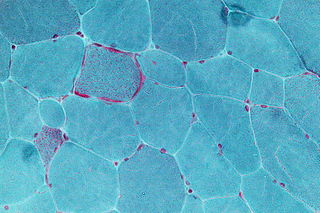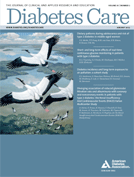
A metabolic disorder can happen when abnormal chemical reactions in the body alter the normal metabolic process. It can also be defined as inherited single gene anomaly, most of which are autosomal recessive.

Shahid Beheshti University of Medical Sciences is one of the three medical universities in Tehran, the capital of Iran. It began in 1961 with the establishment of the Schools of Medicine and Dentistry. Following the merging of some of the treatment and educational units and organizations affiliated to the then Ministry of Health and “Melli University” in 1986, Shahid Beheshti University of Medical Sciences began its activities independently.
The Endocrine Society is a professional, international medical organization in the field of endocrinology and metabolism, founded in 1916 as The Association for the Study of Internal Secretions. The official name of the organization was changed to the Endocrine Society on January 1, 1952. It is a leading organization in the field and publishes four leading journals. It has more than 17,000 members from over 120 countries in medicine, molecular and cellular biology, biochemistry, physiology, genetics, immunology, education, industry, and allied health. The Society's mission is: "to advance excellence in endocrinology and promote its essential and integrative role in scientific discovery, medical practice, and human health."

The Cambridge Biomedical Campus is the largest centre of medical research and health science in Europe. The site is located at the southern end of Hills Road in Cambridge, England. Over 20,000 people work at the site and is home to a number of organisations including: Cambridge University Hospitals NHS Foundation Trust, Royal Papworth Hospital NHS Foundation Trust, Abcam, the Wellcome Trust, Cancer Research UK, the university's medical school, the UK government's Medical Research Council and has National Institute for Health Research Biomedical Research Centre status. It is an accredited UK academic health science centre.
The Helmholtz Zentrum München is a member of the Helmholtz Association of German Research Centres and is responsible for studying environmental health issues. Founded in 1964 as ″Gesellschaft für Strahlenforschung″ (GSF), it is a joint project of the Federal Ministry of Education and Research and Bavaria's Finance Ministry. Nowadays the Helmholtz Zentrum München's focus is to investigate chronic diseases like diabetes, cancer, lung diseases, illnesses of the immune system or mechanisms of neurodegenerative diseases.

Diabetes Care is a monthly peer-reviewed medical journal published since 1978 by the American Diabetes Association. The journal covers research in the following five categories: 1) clinical care/education/nutrition/psychosocial research, 2) epidemiology/health services research, 3) emerging treatments and technologies, 4) pathophysiology/complications, and 5) cardiovascular and metabolic risk. The journal also publishes clinically relevant review articles, letters to the editor, and commentaries.
Michael Cowley FTSE is an Australian physiologist. He is best known for his mapping of the neural circuits involved in metabolism and obesity and diabetes treatment. He is a professor in the Department of Physiology at Monash University in the Faculty of Biomedical and Psychological Sciences. He is also a director of the Australian diabetes drug development company, Verva Inc, and director of the Monash Obesity & Diabetes Institute] (modi).

Robert H. Lustig is an American pediatric endocrinologist. He is Professor of Pediatrics in the Division of Endocrinology at the University of California, San Francisco (UCSF), where he specializes in neuroendocrinology and childhood obesity. He is also director of UCSF's WATCH program, and president and co-founder of the non-profit Institute for Responsible Nutrition.
Eric Ravussin is a professor in Human Physiology and the Director of the Nutritional Obesity Research Center at Pennington Biomedical Research Center in Baton Rouge, Louisiana. He is also the Douglas L. Gordon Chair in Diabetes and Metabolism at the Center. Since 2012 he has also been a Boyd Professor at Louisiana State University.
Michael Warren Schwartz is Robert H. Williams Endowed Chair, Professor of Medicine in the Division of Metabolism, Endocrinology and Nutrition at the University of Washington and Director of the UW Medicine Diabetes and Obesity Center of Excellence. He is the Director of the NIH-funded Nutrition Obesity Research Center (NORC) at the University of Washington. His research investigates brain mechanisms governing energy balance and glucose metabolism and how obesity and diabetes result from impairment of these brain systems. He has published more than 200 articles and book chapters related to these topics and his research has been continuously funded by the NIH since joining the faculty of UW 18 years ago. Dr. Schwartz is a member of the Association of American Physicians, the Western Association of Physicians, and the American Society for Clinical Investigation, is the recipient of the 2007 Williams-Rachmiel Levine Award for Outstanding Mentorship from the Western Society for Clinical Investigation, the 2006 Naomi Berrie Award for Outstanding Achievement in Diabetes Research from Columbia University, and was the 2012 Solomon A. Berson Lecturer for the American Physiological Society, among other awards. He is a member of the editorial boards of the Journal of Clinical Investigation, American Journal of Physiology, Endocrine Reviews, Molecular Metabolism and Frontiers in Neuroendocrinology.
The Jean Mayer Human Nutrition Research Center on Aging (HNRCA), located in Boston, Massachusetts, is one of six human nutrition research centers in the United States supported by the United States Department of Agriculture Agricultural Research Service. The goal of the HNRCA, which is managed by Tufts University, is to explore the relationship between nutrition, physical activity, and healthy and active aging.
The National Institute of Diabetes and Digestive and Kidney Diseases (NIDDK) is part of the United States National Institutes of Health, which in turn is part of the Department of Health and Human Services. NIDDK is approximately the fifth-largest of the 27 NIH institutes. The institute's mission is to support research, training, and communication with the public in the topic areas of "diabetes and other endocrine and metabolic diseases; digestive diseases, nutritional disorders, and obesity; and kidney, urologic, and hematologic diseases". As of 2015, the Director of the institute is Griffin P. Rodgers, who assumed the position on an acting basis in 2006 and on a permanent basis in 2007.

The Centres de Recherche en Nutrition Humaine or CRNHs is a health research organisation based in France. Its goal is to improve the knowledge on the function properties of food, on metabolism and on human physiology, from basic research to the study of behaviours and their impact on health. The French territory is now provided with four CRNH having common tools and complementary scientific skills that allow them to develop multi center programs using their platforms and their specific skills.

Matthias H. Tschöp is a German physician and scientist. He is the Chief Executive Officer and Scientific Director at Helmholtz Zentrum München, German Center for Environmental Health. He also is Alexander von Humboldt Professor and Chair of Metabolic Diseases at Technical University of Munich and serves as founding Director of Biomedicine at the Helmholtz Pioneer Campus and is an adjunct Professor at Yale University.

Anoop Misra is an Indian endocrinologist and a former honorary physician to the Prime Minister of India. He is the chairman of Fortis Centre for Diabetes, Obesity and Cholesterol (C-DOC) and heads, National Diabetes Obesity and Cholesterol Foundation (NDOC). A former Fellow of the World Health Organization at the Royal Free Hospital, UK, Misra is a recipient of the Dr. B. C. Roy Award, the highest Indian award in the medical category. The Government of India awarded him the fourth highest civilian honour of the Padma Shri, in 2007, for his contributions to Indian medicine.

Christos Socrates Mantzoros is a Greek American physician scientist, internist - endocrinologist, teacher, researcher, Harvard Medical School professor and the editor-in-chief of the journal Metabolism: Clinical and Experimental. He is considered a pioneer and worldwide expert in obesity and metabolism. He has given more than 500 lectures nationally and internationally on these critical topics. His research has resulted in more than 800 publications in Medline, including more than 150 publications under the collaborative Look Ahead Research Group, more than 200 chapters and reviews and has received more than 93,000 citations with an h-index=127 as well as prestigious awards at national and international meetings.
Rexford Sefah Ahima is a Professor of Medicine, Public Health and Nursing; Bloomberg Distinguished Professor of Diabetes at the Johns Hopkins Medical School; and the Director of the Division of Endocrinology, Diabetes and Metabolism, Johns Hopkins University School of Medicine. Ahima's research focuses on central and peripheral actions of adipocyte hormones in energy homeostasis, and glucose and lipid metabolism. Ahima is the Editor In Chief of the Journal of Clinical Investigation.
William T. Cefalu is an American physician-scientist. Cefalu is the chief scientific and medical officer of the American Diabetes Association.









